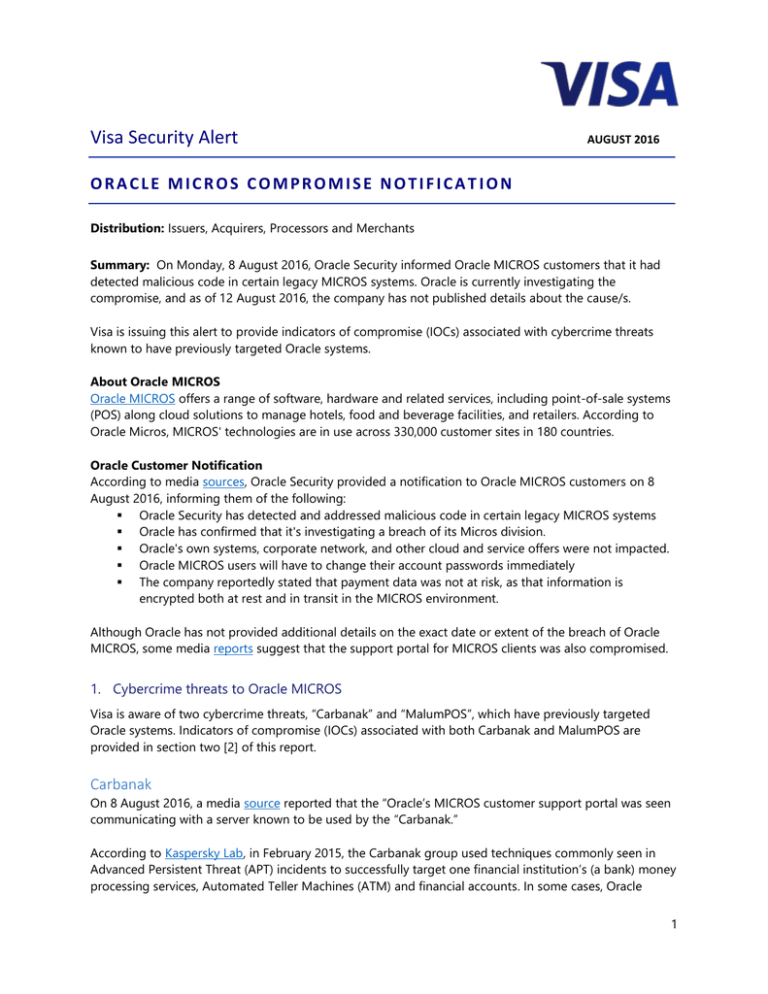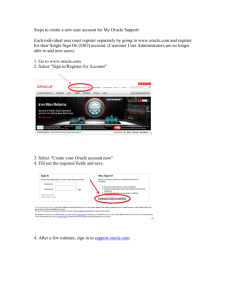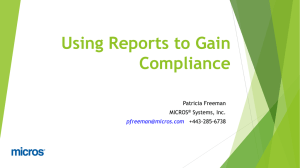Visa Security Alert
advertisement

Visa Security Alert AUGUST 2016 ORACLE MICROS COMPROMISE NOTIFICATION Distribution: Issuers, Acquirers, Processors and Merchants Summary: On Monday, 8 August 2016, Oracle Security informed Oracle MICROS customers that it had detected malicious code in certain legacy MICROS systems. Oracle is currently investigating the compromise, and as of 12 August 2016, the company has not published details about the cause/s. Visa is issuing this alert to provide indicators of compromise (IOCs) associated with cybercrime threats known to have previously targeted Oracle systems. About Oracle MICROS Oracle MICROS offers a range of software, hardware and related services, including point-of-sale systems (POS) along cloud solutions to manage hotels, food and beverage facilities, and retailers. According to Oracle Micros, MICROS' technologies are in use across 330,000 customer sites in 180 countries. Oracle Customer Notification According to media sources, Oracle Security provided a notification to Oracle MICROS customers on 8 August 2016, informing them of the following: Oracle Security has detected and addressed malicious code in certain legacy MICROS systems Oracle has confirmed that it's investigating a breach of its Micros division. Oracle's own systems, corporate network, and other cloud and service offers were not impacted. Oracle MICROS users will have to change their account passwords immediately The company reportedly stated that payment data was not at risk, as that information is encrypted both at rest and in transit in the MICROS environment. Although Oracle has not provided additional details on the exact date or extent of the breach of Oracle MICROS, some media reports suggest that the support portal for MICROS clients was also compromised. 1. Cybercrime threats to Oracle MICROS Visa is aware of two cybercrime threats, “Carbanak” and “MalumPOS”, which have previously targeted Oracle systems. Indicators of compromise (IOCs) associated with both Carbanak and MalumPOS are provided in section two [2] of this report. Carbanak On 8 August 2016, a media source reported that the “Oracle’s MICROS customer support portal was seen communicating with a server known to be used by the “Carbanak.” According to Kaspersky Lab, in February 2015, the Carbanak group used techniques commonly seen in Advanced Persistent Threat (APT) incidents to successfully target one financial institution’s (a bank) money processing services, Automated Teller Machines (ATM) and financial accounts. In some cases, Oracle 1 databases were manipulated to open payment or debit card accounts at the same bank or to transfer money between accounts using the online banking system. The ATM network was also used to dispense cash from certain ATMs at certain times where money mules were ready to collect it as part of this operation. In March 2015, Visa provided an industry-wide public alert and mitigation guidance concerning Carbanak. Visa recommends that all financial institutions and retailers scan their networks for the presence of Carbanak. If detected, please contact law enforcement immediately and activate security incident procedures. MalumPOS Discovered by TrendMicro in 2015, MalumPOS is known to specifically target Oracle MICROS point-ofsale devices. MalumPOS is described as simple and non-obfuscated malware, written in the Delphi programming language. Visa is aware that MalumPOS is still actively used by cyber criminals. 2. Mitigation action recommended for Oracle Micros Customers Change passwords for any account used by a MICROS representative to access the customer’s on-premises systems. Scan network for the following: – Psexec file – Files with .bin extension (located in \All users\%AppData%\Mozilla\ or c:\ProgramData\Mozilla\) – Svchost.exe file (located in Windows\System32\com\catalogue\) – Svchost.exefile (located in C:\ProgramData\Mozilla\svchost.exe) This file provided remote access functions, such as the ability to execute arbitrary commands, upload/download files. – Operating system (Windows) running services ending in “sys” Scan networks for IOCs linked to Carbanak: 2 Scan networks for IOCs linked to MalumPOS: File Name Mnv.exe File Name 757ae5eed0c5e229ad9bae586f1281b5de053767 Nvsvc.exe Nvsvc.exe 2cf2f41d2454b59641a84f8180fd7e32135a0dbc f728bf7d6dbfc4c7bea21d6a3fd0b88f4fe52a4a Nvsvc.exe 798bc2d91293c18af7e99ba7c9a4fd3010051741 Nvsvc.exe 90e85b471b64667dbcde3aee3fa504c0d4b0ad35 Rdp.exe Winini.exe fe713f9bb90b999250c3b6a3bba965d603de32a3 d0b3562d868694fd1147e15483f88f3a78ebedfb Description Oracle Forms process, MICROS 9700 VISAD Driver MICROS 9700 SSL GW Oracle Forms process, Webbased PoS systems Accessed through MicrosoftTM, Windows Internet Explorer, Shift4 Corporation Universal Transaction Gateway, PAR Springer-Miller Systems Looks like a test Client stub Additionally, Visa recommends the following best practices to reduce the risk of exposure: – Educate employees how to avoid phishing scams and opening emails with attachments – Maintain updates for all software and patches (address zero day vulnerabilities) – Turn on heuristics (behavioral analysis) on anti-malware to search for suspicious behavior Visa will continue to report any mitigation guidance, technical indicators of compromise associated with this compromise, or additional details on the overall extent of the compromise as details are made available. For questions and information please contact, paymentintelligence@visa.com To report a data breach, contact Visa Fraud Control: Asia Pacific Region, Central Europe/Middle East/Africa Region: VIFraudControl@visa.com U.S. and Canada: USFraudControl@visa.com 3


